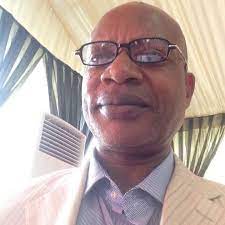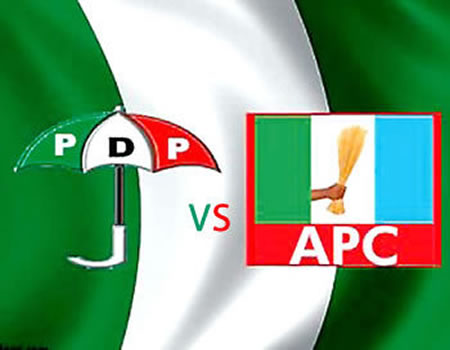By Ehichioya Ezomon
The tale of “the pot calling the kettle black” is relayed by en.wikipedia.org thus: “Oho!” said the pot to the kettle; “You are dirty and ugly and black! Sure no one would think you were metal, except when you’re given a crack.” “Not so! Not so!” kettle said to the pot;” ‘Tis your own dirty image you see; for I am so clean – without blemish or blot – That your blackness is mirrored in me.”


Ahead of the 2023 elections, the counsel of former chairman of the Independent National Electoral Commission, Prof. Attahiru Jega, highlights the dogfight and hypocrisy between the All Progressives Congress and the Peoples Democratic Party.
Jega, who umpired the 2015 polls that ousted the Dr Goodluck Jonathan presidency, and enthroned the Gen. Muhammadu Buhari regime, says either of APC or PDP, as “Siamese twin” of different faces, doesn’t deserve another coronation in 2023.
Reviewing his experiences as chairman of the INEC, Jega warns Nigerians “to be afraid of” the manner politicians conduct elections and represent the people, who vote them into power. His words: “Since 1979, I’ve been teaching in the university for 40 years now. So, from what I read and observed when I was Chairman of INEC, honestly, the way I see our politicians conducting elections, and from the manner they represent their people when elected, it is something to be afraid of.”
But the APC and PDP, which view Jega from different angles, were swift to dismiss his comments as wrongheaded, coming from a politician championing the cause of his political party.
Prof. Jega, a member of the Peoples Redemption Party (PRP), likely appropriated that platform to urge that it’s time Nigerians dumped the APC and PDP, and “look for a credible alternative. “Nigerians should dump the two parties because of their bad antecedents over the last 20 years,” Jega said, adding: “Looking at their inability to change the economic fortunes of Nigeria for 20 years now, it is apparently clear that they would not do anything even if Nigerians vote for any of the two parties again.”
In their separate reactions, the APC and PDP, rather than address the kernel of Jega’s comments, resorted to blaming each other for the observed ills arising from their governance of the country. Secretary of APC’s Caretaker/Extraordinary Convention Planning Committee, Sen. Akpan Udoedehe, said Jega’s comments were “uncontrolled, wrong and untenable political outburst.”
The APC said: “While the PDP failed to meet the expectations of Nigerians as a government and opposition party, the APC is thriving, healthy and assiduously cleaning the massive mess left behind by the PDP, which failed to deliver democratic dividends to the people of Nigeria after being in charge of the country for 16 years.
“While Professor Jega is right about the PDP, a party under which he served as the Chairman of the nation’s election management body, we reject his comparison of the APC with the PDP.”
To the PDP National Publicity Secretary, Kola Ologbondiyan, Jega is “trying to dry-clean the rudderless, inept and debauched” APC that brought “unbearable devastation to our nation in… six years.”
The PDP alleged that Jega, who had described the APC and the Buhari administration as “a failure,” was embarking on “image laundering” for the APC due to his “appointment as Chairman of the Governing Council of University of Jos by President Buhari.”
The PDP declared: “Trying to compare the “incompetent and decadent APC to the highly-productive and development-oriented PDP is an unpardonable disservice to our nation and calls to question the sense of judgment of Professor Jega.”
Jega’s admonition is an uppercut to the solar-plexus of the two major political parties already canceling themselves out with barely one and half years to the February 2023 presidential election.
It’s been a “coni man die, coni man beri am” tangle over what mode of primary the parties should adopt in picking their candidates for elective legislative and executive positions in 2023.
Considering report by its Committee on Electoral Matters on the Electoral Act 2010 (Amendment) Bill, the House of Representatives adopted “direct primary” for parties to choose their candidates. House Speaker Femi Gbajabiamila had called for removal of the option contained in section 87(2) of the Electoral Act 2010, which prescribes that, “the procedure for the nomination of candidates… for… elective positions shall be by direct or indirect primaries.”
Gbajabiamila said that “in the true ethos of democracy, I would like to amend Section 87 to delete indirect (primary) and make direct primary mandatory.” And when Majority Leader Alhassan Ado-Doguwa seconded the proposal, and presiding Deputy Speaker Ahmed Wase put it to voice vote, the lawmakers adopted it. But the PDP, via the PDP Governors’ Forum’s eleventh meeting in Bauchi State in late July rejected the proposal as a gift to the ruling APC to manipulate the primary processes to enhance its political standing ahead of the 2023 general election.
The PDP governors said that direct primary is prone to massive rigging, citing the 2018 APC presidential primary in which Buhari scored about 15 million votes, but only secured 15 million votes from the entire country in the 2019 general election.
The governors advised that political parties be allowed to decide whether to use direct or indirect methods of conducting primaries, “as part of internal democracy in political parties.”
Dispelling allegations that Buhari is planning self-succession, and that the direct primary adopted by the APC-dominated National Assembly is to favour the party in the 2023, Sen. Udoedehe said the APC would produce a consensus candidate for the poll.
“Unlike the opposition, we are a disciplined party. PDP is just being haunted by its past. Recall the inglorious third term agenda while PDP was in power. So, it is easy to accuse APC now,” he said.
“APC has no 3rd term agenda like PDP. After our congresses and the National Convention, we will shock them (PDP) by bringing a consensus, and an agreeable candidate that will fly the flag of the party come 2023.”
Sen. Udoedehe said the APC is encouraging states to adopt the consensus “because it saves costs and reduces acrimony,” adding, that the first option in Article 20 of the APC constitution “is for members to try reaching a consensus.”
This is the clearest sign yet that the APC, which had wrestled with adopting direct or indirect primary, may’ve allayed members’ suspense and fear over the sensitive and divisive issue.
Though the APC, particularly in 2019, picked direct primary to choose President Buhari for his re-election, the mode was fiercely resisted by governors that control state chapters of the party.
The APC’s insistence on the method caused upheaval in, and loss of several states to the PDP, and the sack of the Comrade Adams Oshiomhole-led National Working Committee.
Embracing the suggestion by the Caretaker Committee, most APC chapters adopted consensus in the July 31 congresses that witnessed postponements, abandonment or parallel congresses.
The PDP, watching and amusing itself from the sidelines, is also reportedly plotting a consensus arrangement, a ploy that may backfire should the party attempt to foist a candidate on the tens of its independent-minded gladiatorial presidential aspirants.
- Ezomon, Journalist and Media Consultant, writes from Lagos, Nigeria.




GIPHY App Key not set. Please check settings